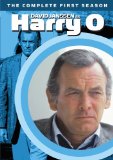| Reviews & Columns |
|
Reviews DVD TV on DVD Blu-ray 4K UHD International DVDs In Theaters Reviews by Studio Video Games Features Collector Series DVDs Easter Egg Database Interviews DVD Talk Radio Feature Articles Columns Anime Talk DVD Savant Horror DVDs The M.O.D. Squad Art House HD Talk Silent DVD
|
DVD Talk Forum |
|
|
| Resources |
|
DVD Price Search Customer Service #'s RCE Info Links |
|
Columns
|
|
|
Harry O: The Complete First Season
They couldn't just leave it alone. Warner Bros.' unstoppable M.O.D. (manufactured on demand) service, the Archive Collection, which caters to movie hounds seeking out rare, hard-to-find library and cult movie and TV titles, has released Harry O: The Complete First Season, a six-disc, 22-episode collection of the cult ABC detective series' premiere 1974-1975 season, starring TV icon David Janssen. The "anti-Mannix" if there ever was a television detective, Harry O from its inception was forever being tinkered with...which is too bad, because the suits "fixed" themselves right out of a what could have been one of the 1970s' greatest detective shows. As a bonus, the first of two original pilots, Such Dust as Dreams Are Made On, has been included in this good-looking transfer.
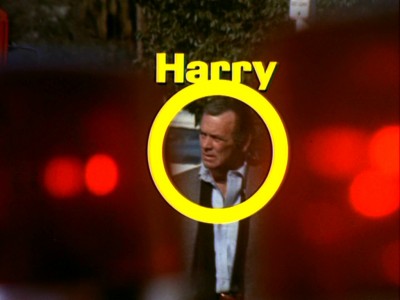
Every morning, Harry Orwell (David Janssen) wakes up with a grimace on his face, and it stays there all day. Why? Because this former Los Angeles Police Department detective has a bullet lodged in his back. So...it's either live with the constant pain, or risk an operation too close to his spine that may paralyze him. Living in a small, ramshackle beach house on Coronado Island in San Diego, Harry O supplements his monthly disability checks―and alleviates his boredom―with part-time private investigation work...but it's still not enough to fix up his dilapidated boat, The Answer, or his equally iffy little Austin-Healey convertible. So Harry O takes the bus wherever he needs to go, because it gives a man "time to think." And Harry O has a lot of time to think, a lot of time to try and search for some answers to his downbeat life. That is...when he's not getting shot at.
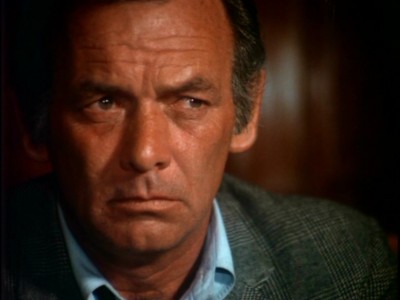
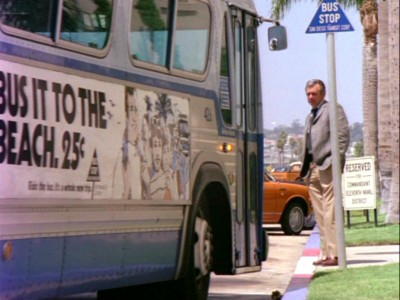
Last summer, I had the distinct pleasure of getting reacquainted with Harry O after 30 years or so when I reviewed Warner's Archive Collection disc of the series' second, successful pilot, Smile Jenny, You're Dead. As I wrote back then, I remember the show well because Janssen's Harry Orwell was so temperamentally different from the other TV detectives on the networks at that time (as cool as the Harry O title is, as a kid I must have thought this was just a continuation of Janssen's previous similar-sounding failure: O'Hara: U.S. Treasury. Maybe other viewers did, too). Unlike the spit-and-polish, no-nonsense defenders of the California Penal Code over on Adam-12, or the glamorous, almost-Bondian cops and detectives of Hawaii Five-O or Mannix, or even the portly-but-pleased-with-himself Cannon, Harry O was a mess, an existential character in constant physical pain and frequent psychological distress. He didn't have a lot of money, he didn't seem to have very many prospects, and that bullet in his back wasn't ever going to go away (...except in the second season, when the producers went even further afield of the show's original, superior concept). Now of course, Harry Orwell still occupied that fantasy world of TV private investigation: he's fairly blase about collecting a fee (something Joe Mannix was infamous for), and he has a supernatural ability to get the hottest women to fall instantly into his bed...if he so chooses. But even Harry's closest spiritual competition, Jim Rockford, who premiered the same year in NBC's classic, The Rockford Files, knew how to have a good time with his barbecues and beautiful women and his gold Firebird. Here, in Harry O, Harry has few friends over for laughs, and he travels around town...on a bus―the single least glamorous mode of transportation I can think of in the fantasy world of television detectives. Nothing says, "sex appeal" like mass transit.
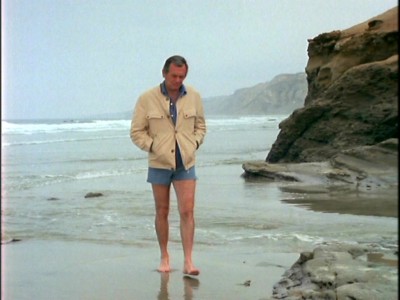
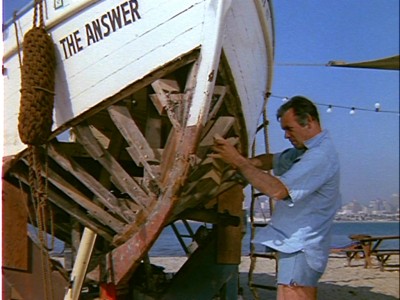
Indeed, even though Jim Garner's Jim Rockford lived in modest-at-best circumstances, the tone of his series was still essentially light: Maverick as modern-day private dick. In Harry O, the tone is exceedingly low-key, often mournful, with star David Janssen's mordant, gaze-averting grumbling and general air of being slightly pissed-off at everything and everyone fitting perfectly together. When a little sunshine does penetrate Harry's closed-off world, it's almost always framed cynically, and it rarely leads to permanence. If Harry makes friends with someone from one of his cases, they soon move away. If he falls in love...same thing. Following the template set by the series' creator, crack writer Howard Rodman (TV's The Naked City, three terrific Don Siegel films: Coogan's Bluff, Madigan, and Charley Varrick), Harry O's downbeat musings are beautifully conveyed by the old noir standby of a cynical, world-weary narration, utilizing Janssen's rusty, rumbly voice to great effect (in Mortal Sin, Harry comforts a widow: "She hung on to me as if I was the edge of a cliff. Then a doctor got there and she let go and started falling."). You certainly couldn't call Harry Orwell a counterculture figure by 1974 standards, but the writers drop in enough little clues―Harry's boat is called The Answer, and his dream is to literally "drop out" and sail his boat away from all civilization ("telephones bug me")―to make the Harry O character attractive to younger viewers in 1974, while setting him apart from his acquisitive, "good life"-loving partners in TV detection. When it all boils down, Harry just wants to get through the day without his back hurting (listen to the anti-Mannix bitch about the mundane aspects of life never contemplated by two-fisted Joe: "Shopping isn't one of my favorite things. Neither is planning ahead. Now how am I gonna know what I want for dinner tomorrow? How am I gonna know I'll want dinner tomorrow? How do I know there's gonna be a tomorrow?").
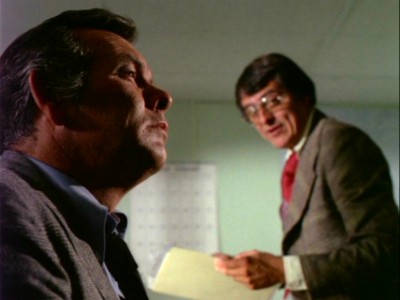
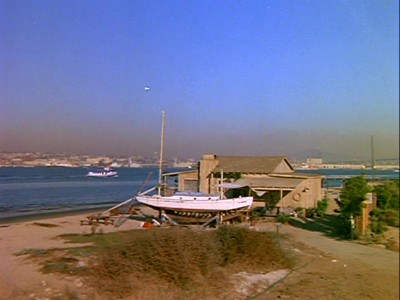
...it's just too bad ABC and the producers didn't have the nerve to stay in that same vein with Harry O, instead of fiddling with it in the search for bigger Nielsen numbers. Now, I'm the last person to blame the network people for trying to make Harry O more "commercial." Television, then and now, is a business first and last, and an expensive series like Harry O had to connect with the public to justify its production costs. So if the first pilot, Such Dust as Dreams Are Made On didn't work (and it doesn't), then a second pilot, Smile Jenny, You're Dead, was deemed a "safe" risk. And once Harry O started production, if the episodes weren't "turning on" the network execs and ad salesmen, and initial ratings were low, then "retooling" the concept was considered imperative, lest a lot of seed money went down the drain (Janssen, still considered a big, big TV draw at this time with a gold-standard Q-Rating, was no doubt a factor in these decisions, too). I get all that from a business standpoint, but as a lover of television in all its various permutations, it's a shame to see something genuinely unique like the first 13 or 14 episodes of Harry O's first season morph into the remaining, well-done-but-much-more-conventional eight episodes.
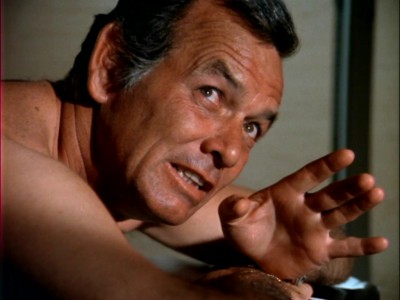
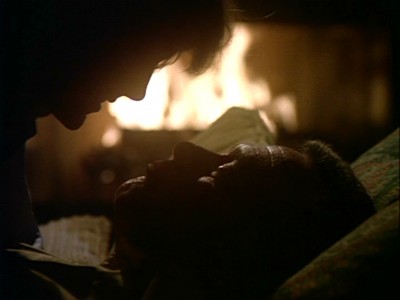
Take that first episode, Gertrude, not coincidentally scripted by Howard Rodman. Ostensibly about some diamond smugglers, Gertrude doesn't really care too much about the mystery, spending much more time exploring Harry's world as he talks of leaving town to visit the circus...900 miles away (it's one of those days), with Janssen beautifully intoning that noirish voice-over as he contemplates ignoring the world again ("I figured I'd answer the phone if it rang 18 times," Harry capriciously rumbles). In this episode, Harry the TV detective doesn't lose a tail by beating him senseless or peeling out in his 70s muscle car...he walks to the next bus stop, of which he has encyclopedic knowledge of their locations in and around San Diego. And to his credit, he keeps his fee...clutching, like a small child, the cookie jar in which it was left.
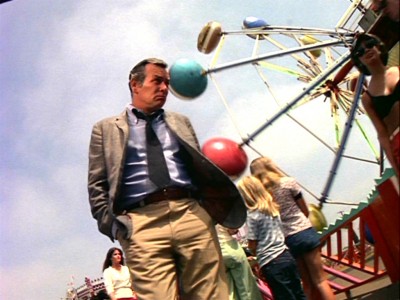
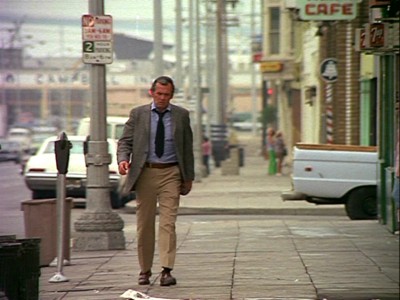
The Harry O of these first 13 episodes is a quixotic, searching character, sure of only one thing―things probably aren't going to work out―filling up his days with working on his boat, or doing the crosswords when they don't annoy him ("What are you reading?" "Kipling." "I would never have suspected you of liking the classics." "It helps me with the crosswords."), and running on the beach...and away from his problems. In the beautiful Guardian at the Gates, scripted by Stephen Kandel, Harry is asked by his new lover, Linda Evans, "What do you need, Harry?" to which he simply responds, "Not much more than I have. A few friends, a little room, time to find out what I want...what I am." And when he falls in love, such as in the episode above, it seems quite realistic, beginning with attraction, becoming complicated by mistrust and obstacles, consummated with genuine feelings (check out that romantic fireside kiss)...only to end unsuccessfully (you never got the feeling that Joe Mannix fell truly in love with anyone except his gorgeous self).
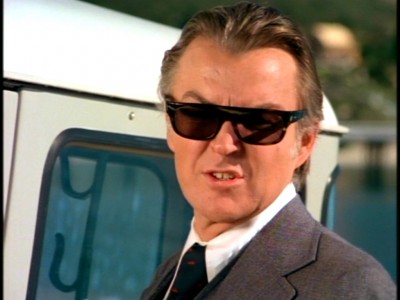
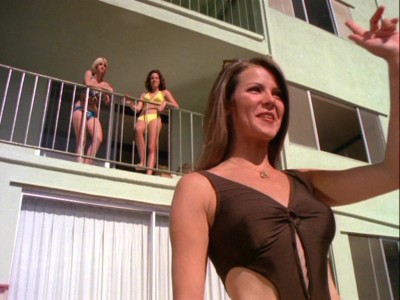
Notably, these early episodes were filmed in and around San Diego, and the different unfamiliar atmosphere of the production is immediately noticeable. This isn't the overly-recognizable TV world of "in and around greater Los Angeles area" that was the generic location site of 95% of network television in 1974. Harry O feels more "authentic," if you will for a scripted, fictional TV detective series, having been shot outside of L.A., with the preponderance of real sets and more authentic lighting adding to the show's verisimilitude (Eyewitness is particularly good, shot in a seedy downtown section of Dago). The episodes from this first half of the season are exceptionally consistent in tone and direction, from something beautifully stylish and quite...sick in its turning around genre conventions like Coinage of the Realm (watch the remarkably funny/tense scene where Harry gets his two assassin tailers to help push his broken-down car), to a full-bodied two-part take-off on Chinatown in 40 Reasons to Kill (Janssen's complicated, doomed romance with Joanna Pettet is marvelously realized), to more conventional fare like Accounts Balanced (Robert Reed has never been better as an ice-cold cipher assassin) or The Last Heir (a highly amusing, studio-bound take-off on Ten Little Indians). Had Harry O stayed in Dago and kept Harry downtrodden, and existential, and wounded, a genuine classic would have been born...even if it only lasted one season.
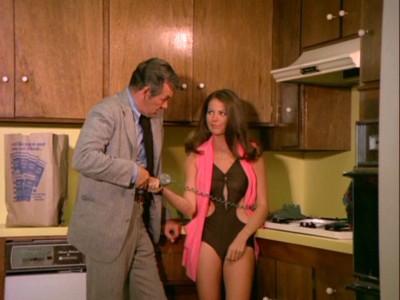
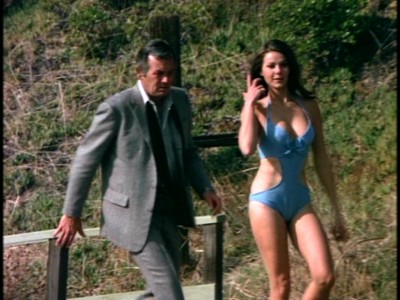
Instead, they took the anti-Mannix and made him more...Mannix-y. With For the Love of Money, a decidedly more chipper-sounding Harry announces, after the re-tooled opening credit sequence that he's on assignment in Los Angeles (the once doleful theme has been jazzed up to tell us it's "exciting" now). He rents a swank beachside apartment in Santa Monica where he's immediately befriended by three bikini-clad girls, headed up by the luscious, stacked brunette Kathrine Baumann (everyone mentions Farrah when they talk about Harry O, but I'll take knee-weakening Baumann any day). Sharon Farrell costars in this well-made but familiar tale, and she's bikini-clad, as well―it almost makes you weep to see how obvious all this pandering is to the perceived likes of the male-dominated audience. Harry also gets a new authority figure to clash with: Anthony Zerbe's Lt. K. C. Trench, who seems remarkably more amenable to Harry hanging around his office, demanding services that no private eye in the world would get from cops who hate private detectives. Now don't get me wrong: Zerbe, a great actor, has fun chemistry with Janssen, who seems happy to have him on board. But their relationship is ridiculous compared to the relatively more realistic one created by Janssen and the terrific Henry Darrow as Lt. Manny Quinlan, who genuinely seemed to dislike Harry and whose angry antagonism towards the interfering private dick created some believable dramatic tension in the earlier episodes.
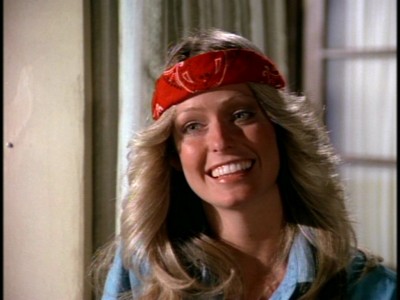
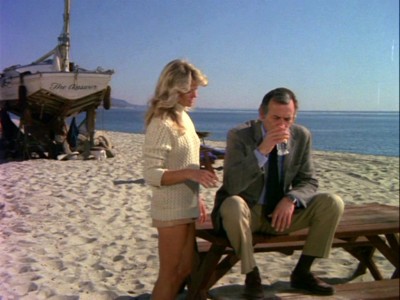
But alas, that kind of double act wasn't called for anymore in the "new and improved" Harry O, so it's time for Harry to gradually ditch the bus (his car had a miraculous recovery), and to gradually ease off on the narration (who cares what Harry thinks anymore if Harry isn't "Harry" anymore?), and to gradually start carrying a gun and gradually slugging it out with the perps, with nary a mention of the bullet in his back (in the old episodes, a simple shove from a suspect was enough to put out Harry's lights). Harry casually mentions that his beloved beach bungalow back in Dago has been bulldozed and that Santa Monica is now home plate (uh...a California disability check buys a beachfront cottage in Santa Monica?), and the girls come and go (lush Baumann is unceremoniously dumped for soon-to-be pop culture phenomenon, Farrah Fawcett-Majors), and increasingly indestructible, increasingly unremarkable Harry's adventures become more thoroughly routine with each passing episode. They're well-produced, and they're marginally exciting, and Janssen seems to be ad-libbing on every page...but the soul of the original Harry O, is gone.
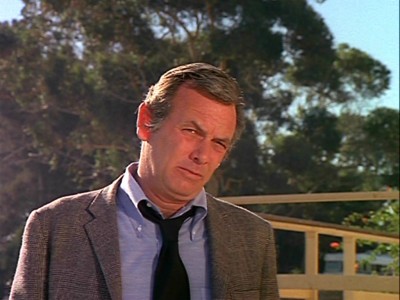
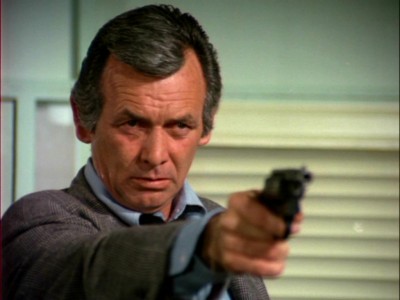
The DVD:
The Video:
The full-screen, 1.33:1 transfer for Harry O: The Complete First Season looks good, with generally good color, some expected screen anomalies like scratches and dirt, and a medium-sharp image. All episodes appear to be complete, with running times of 50 to 51 minutes and change.
The Audio:
The Dolby Digital English mono audio track is clean, with low hiss and no subtitles or closed-captions available.
The Extras:
The first pilot for Harry O, Such Dust as Dreams Are Made On is included as a cool bonus, particularly for those who already own the second pilot, Smile Jenny, You're Dead. As for this pilot...it was the right move to ditch it (no narration, no feel for the character, quite routine).
Final Thoughts:
Hey, 13 genuinely quirky, classic episodes is enough, I guess. Had the suits behind Harry O stayed frosty and kept plugging away at turning those classic 70s detective series conventions on their ears...Harry O would still probably have failed with audiences. So the re-tooling was understandable. And to be fair, the remaining episodes are well done and entertaining. They're just not...you know. A big event for lovers of unique 70s television, I'm highly, highly recommending Harry O: The Complete First Season.
Paul Mavis is an internationally published movie and television historian, a member of the Online Film Critics Society, and the author of The Espionage Filmography.


|
| Popular Reviews |
| Sponsored Links |
|
|
| Sponsored Links |
|
|
| Release List | Reviews | Shop | Newsletter | Forum | DVD Giveaways | Blu-Ray | Advertise |
|
Copyright 2024 DVDTalk.com All Rights Reserved. Legal Info, Privacy Policy, Terms of Use,
Manage Preferences,
Your Privacy Choices | |||||||









